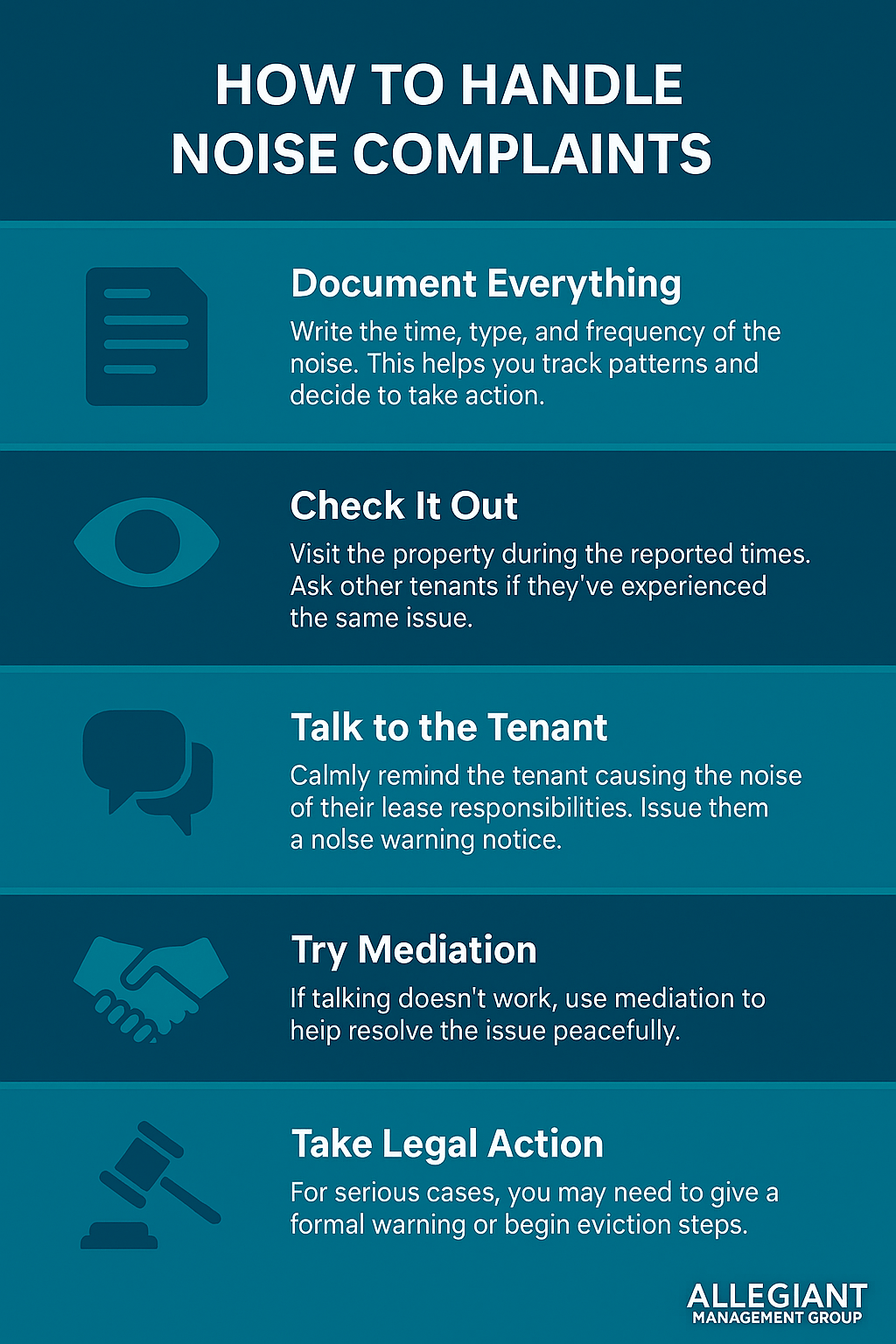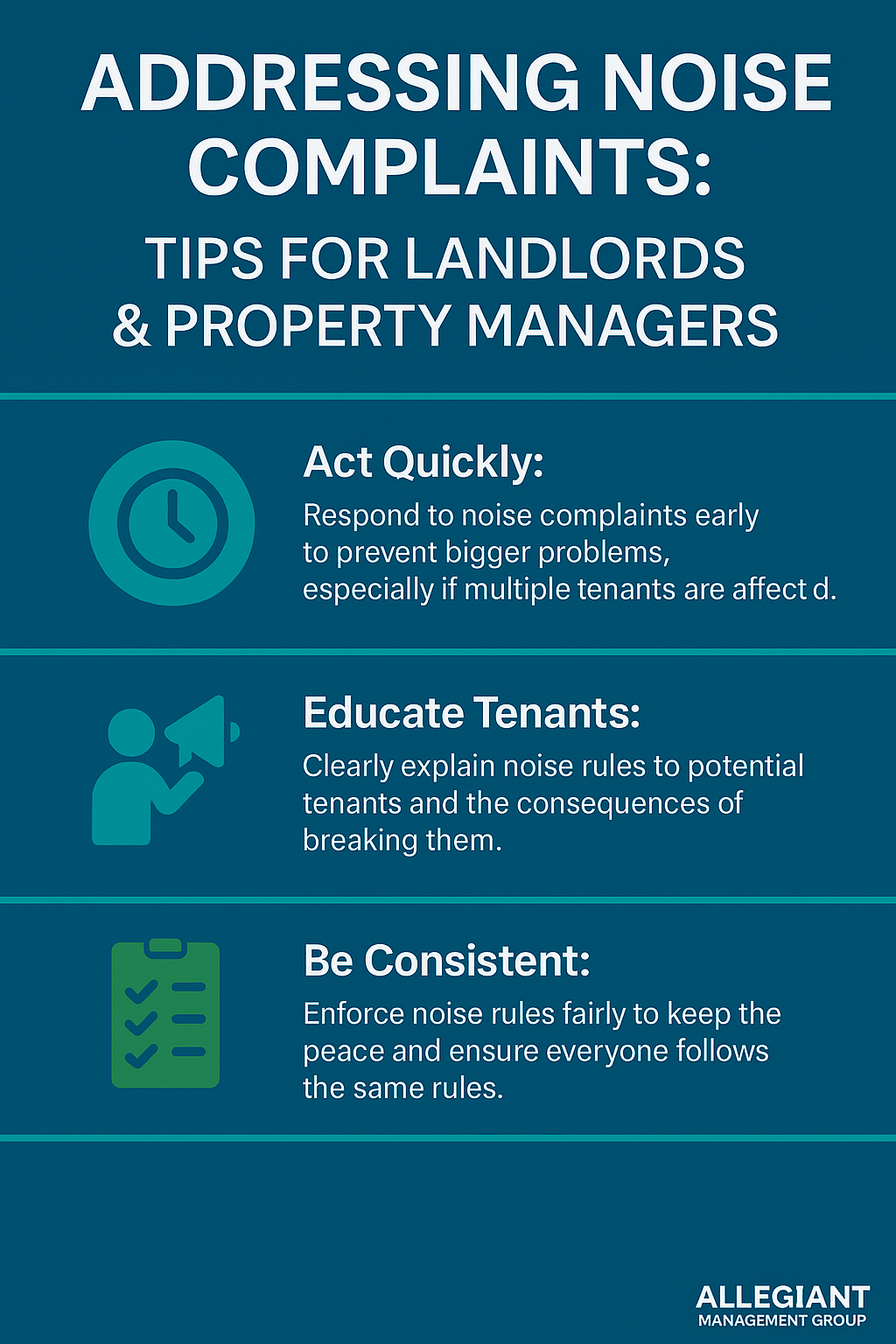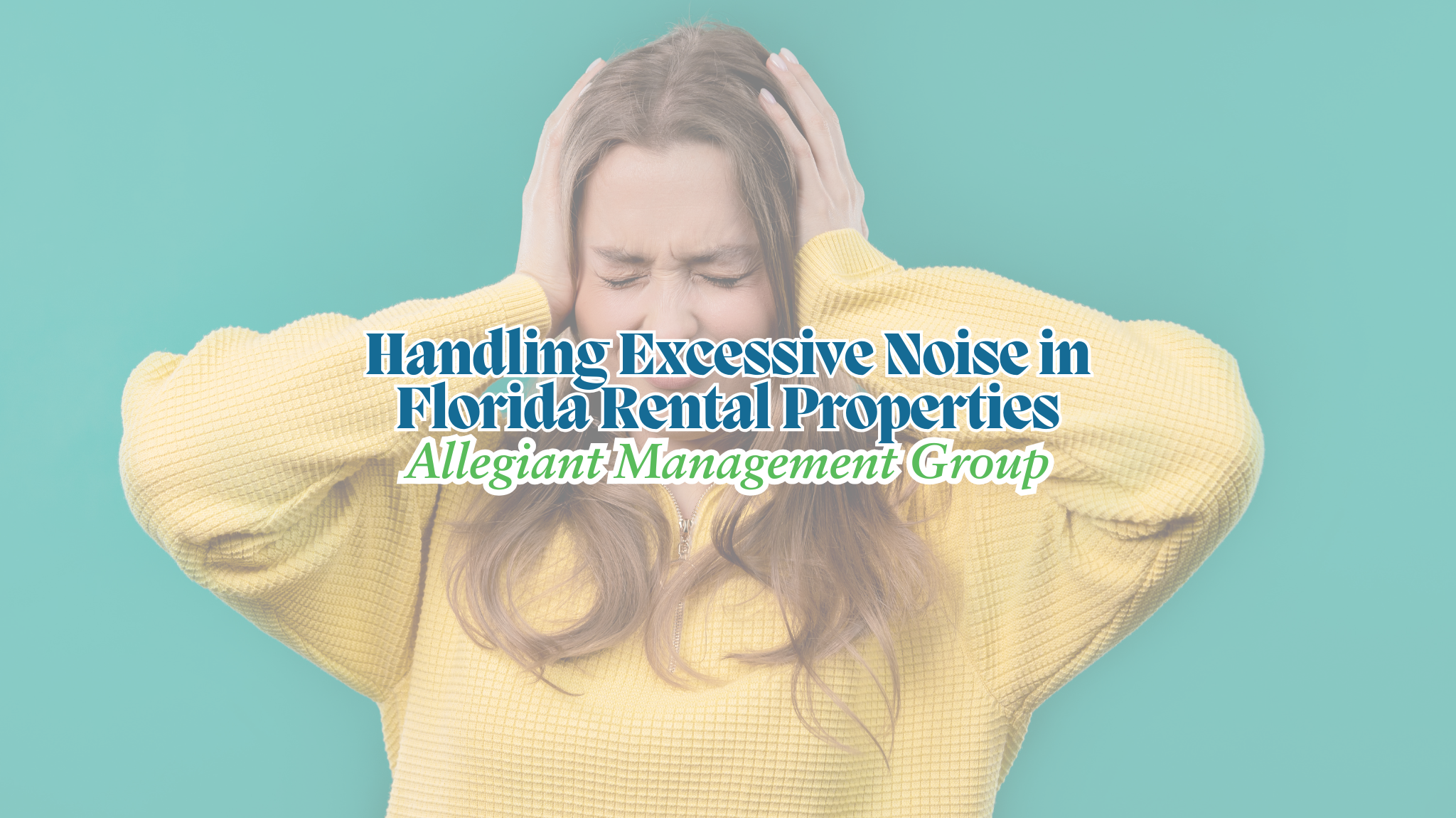Blog Updated: 06/02/2025
Florida Landlords - Handling Excessive Noise Complaints in 2025
Noise complaints can be a long term headache for property owners, landlords and property managers. Not only do they create stress, but if left unaddressed, they can harm tenant relationships and disrupt community peace.
This article will assist you in identifying whom to contact for noise issues or managing a disruptive tenant. The guide will show you how to handle the process in a legal way.

Understanding Noise Ordinances Florida - Overview of Central Florida
In Florida, tenants have the right to peaceful enjoyment of their homes. Excessive loud noise or noise disturbances can be from many different sources. Noise exposure to sources of noise like loud music or barking dogs, or even noise emission from machines and equipment —especially during quiet hours, can violate this right.
In Central Florida, cities like Orlando and Kissimmee have their own noise ordinances to protect residents. For example, Kissimmee updated its ordinance in February 2023, increasing fines for violations:
- First offense: $50
- Repeat offenses: Up to $500
Most local laws limit loud noise at night through local noise regulations. City codes often take priority over landlord tenant laws and other state laws in these cases. For serious disturbances, you or your tenants can contact local police or code enforcement for help.
HOA and Apartment Noise Rules
If your property is part of a Homeowners Association (HOA) or apartment complex, additional noise rules likely apply. These often include:
- Quiet hours, usually from 10 PM to 7 AM
- Fines for violating community noise standards
As a landlord or property manager, it’s important to:
- Inform tenants upfront about HOA or community noise rules
- Include these rules in the lease to ensure proper disclosure
How to Handle Noise Complaints & Noise Pollution
If a tenant complains about noise, here’s how to handle it:
- Document Everything: Write the time, type, and frequency of the noise. This helps you track patterns and decide to take action.
- Check It Out: Visit the property during the reported times. Ask other tenants if they’ve experienced the same issue.
- Talk to the Tenant: Calmly remind the tenant causing the noise of their lease responsibilities. Issue them a noise warning notice.
- Try Mediation: If talking doesn’t work, use mediation to help resolve the issue peacefully.
- Take Legal Action: For serious cases, you may need to give a formal warning or begin eviction steps.

Managing Noise in Multi-Family Homes
Noise travels more easily in shared spaces such as multi-family properties. Therefore prevention is key:
- Set Clear Rules: Include a noise policy in the lease, outlining quiet hours and what’s considered excessive noise.
- Stay in Touch: Send friendly reminders in newsletters or emails about being mindful of noise.
- Improve Soundproofing: Add carpets, curtains, or insulation to help reduce sound between units.
- Encourage Community: Tenants who know each other are more likely to be respectful.
Who To Call For Noise Complaints
When noise becomes a serious issue, it’s important to know who to contact:
- For Immediate Disturbances If you have loud parties or noise at night, call the local police non-emergency line.. You can also use the specific non-911 noise complaint line.
- For Ongoing or Repeated Issues, contact your city’s Code Enforcement Department. They may issue warnings or citations to the offending tenant.
- For HOA Properties, reach out to the HOA or property manager, as they may have their own enforcement procedures.
Tip: In Central Florida cities like Orlando and Kissimmee, each municipality has its own noise complaint process. Visit their city websites or call city hall for guidance.
Legal Options for Landlords
If friendly approaches don’t work, landlords have a few legal tools to address ongoing noise problems:
- Call Local Authorities: In Central Florida, repeated noise issues can be reported to police or code enforcement. Non-emergency cases may result in warnings or citations.
- Talk to a Lawyer: Should formal action be necessary, seek advice from a landlord-tenant lawyer. They’ll guide you on eviction or other legal steps. Be careful—if you accept rent during a notice period without denying it, it could delay or hurt your case.

Tips for Landlords & Property Managers
- Act Quickly: Respond to noise complaints early to prevent bigger problems, especially if multiple tenants are affected.
- Educate Tenants: Clearly explain noise rules to potential tenants and the consequences of breaking them.
- Be Consistent: Enforce noise rules fairly to keep the peace and ensure everyone follows the same rules.

Drowning Out The Noise
Handling noise complaints in Central Florida rental units involves balancing tenant rights, local ordinances, and effective management strategies.
Property managers can solve problems effectively by setting clear rules in rental agreements. They should also manage complaints well and know the legal options available. Working with a property management company offers high level support for noise nuisance.
For help with your properties, and for comprehensive property management services, hire a property manager. Look no further and contact Allegiant Management Group today. Learn more about our Orlando property management services.
Allegiant Management Group offers property management services in Orlando and Central Florida. Our services include rent collection, security deposits, marketing, tenant screening, accounting and more!

Watch our Video on Excessive Loud Noise in Florida Rentals
Frequently Asked Questions (FAQs) - Dealing With Noise Complaints
What are Florida tenants' rights regarding noise?
Florida tenants have the right to enjoy their rental peacefully. This means loud noise from neighbors or the landlord can violate their rights. Local noise ordinances set limits, and tenants can file complaints with landlords or local authorities if disturbances persist. Lease agreements may also outline noise policies.
What are common quiet hours in Florida rental properties?
Common quiet hours in Florida rental properties are 10 PM to 7 AM, but local noise ordinances vary. Lease agreements may specify additional restrictions. Tenants disturbed by excessive noise can report violations to the landlord or local authorities for enforcement.
Can a landlord rightfully evict a tenant for excessive noise?
Yes, a landlord can evict a tenant for too much noise. This is true if it breaks the lease or local noise laws. In Florida, landlords must issue a 7-day notice to cure for lease violations. If the noise continues, they can proceed with eviction through legal channels.
How should landlords investigate excessive noise complaints?
Landlords should investigate noise complaints by gathering details from tenants, checking lease terms, and observing noise levels firsthand. They can speak with the accused tenant, review local noise ordinances, and document complaints. If necessary, issue warnings or a 7-day notice to cure for lease violations.
What are effective noise control methods for multi-family buildings?
Good noise control methods for multi-family buildings include soundproofing walls and floors. Other methods are enforcing quiet hours, using carpets or rugs, and installing noise-reducing insulation. Landlords can also update lease agreements with policies and address complaints promptly to maintain a peaceful environment.
What qualifies as excessive noise in a rental property?
Excessive noise in a rental property includes loud music, shouting, frequent parties, or persistent disturbances beyond reasonable levels. Many leases say that excessive noise is anything that disturbs neighbors' peace. Local authorities usually measure this by noise rules, such as exceeding 55 dB at night. Typically, someone enforces quiet hours from 10 PM to 7 AM.
How can tenants address a noise complaint with neighbors?
Tenants can address a noise complaint by speaking politely with the neighbor, documenting disturbances, and checking local noise ordinances. If noise persists, they should notify the landlord or property management. As a last resort, tenants can file a formal complaint with local authorities or seek mediation.
Are noise complaints anonymous when reported to the landlord?
Noise complaints to landlords can be anonymous, but policies vary. Some landlords keep complaints confidential, while others may inform the tenant to resolve the issue. To ensure anonymity, request confidentiality when reporting or submit complaints in writing without identifying details.
Can I break my lease due to excessive noise?
Yes, you may break your lease due to excessive noise if it violates your right to quiet enjoyment. Document disturbances, report issues to your landlord, and check local tenant laws. If unresolved, you may have legal grounds to terminate your lease without penalty.
Do noise ordinances apply to private properties?
Yes, noise ordinances apply to private properties. Local laws regulate excessive noise from homes, including loud music, parties, or machinery. Violations can lead to fines or legal action. This is especially true during quiet hours, which are usually from 10 PM to 7 AM.
Should landlords include noise policies in lease agreements?
Yes, landlords should include noise related policies in lease agreements to set clear expectations. Policies should define acceptable noise levels, quiet hours, and consequences for violations. This helps prevent disputes and provides legal grounds for addressing excessive noise complaints.
Can a landlord refuse to rent to someone with a history of noise complaints?
Indeed, a landlord may decline to rent to individuals with noise issues. This allows if the decision does not violate fair housing laws. Landlords may check rental history, review complaints, and deny applicants who previously violated lease noise guidelines.
Are landlords responsible for noise from shared walls in multi-family buildings?
Landlords are responsible for addressing excessive noise from shared walls if it violates tenants’ right to quiet enjoyment. They must enforce lease agreements and local noise ordinances. Normal living sounds, like footsteps, are usually not their responsibility. This is true unless poor insulation or building defects cause too much noise.
Disclaimer: The information provided is for general information purposes only and is not legal advice. Please consult a qualified attorney for legal advice. This information does not create an attorney-client relationship.




